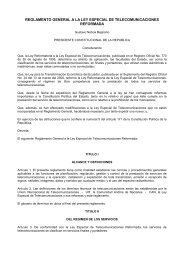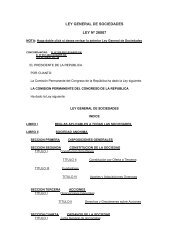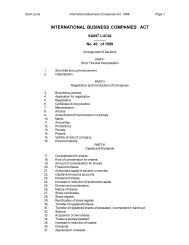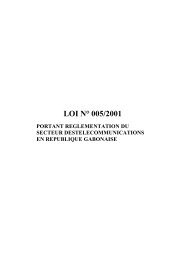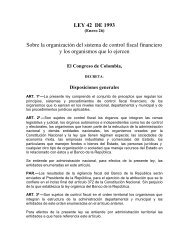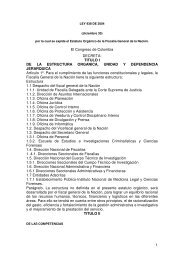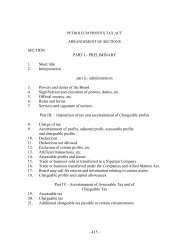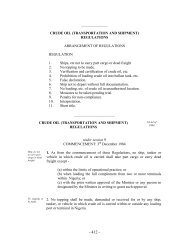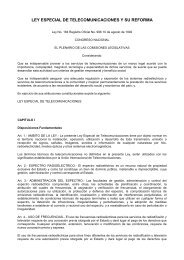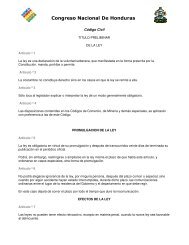the administrative procedures code of georgia - Lexadin
the administrative procedures code of georgia - Lexadin
the administrative procedures code of georgia - Lexadin
Create successful ePaper yourself
Turn your PDF publications into a flip-book with our unique Google optimized e-Paper software.
Translated by IRIS Georgia<br />
Tbilisi, Georgia<br />
THE ADMINISTRATIVE PROCEDURES<br />
CODE OF GEORGIA<br />
A PRIL 2004<br />
Page 1 <strong>of</strong> 16
Translated by IRIS Georgia<br />
Tbilisi, Georgia<br />
TABLE OF CONTENTS<br />
Chapter 1. General Provisions ………………………………………... 3<br />
Chapter 2. Jurisdiction …………………………………………….….. 4<br />
Chapter 3. Impartiality and Challenge ……………………………….... 4<br />
Chapter 4. Proceeding Costs ……………………………………….…. 4<br />
Chapter 5. Term <strong>of</strong> Proceeding. Court Notice ………………………... 5<br />
Chapter 6. Parties to an Administrative Proceeding ………………….. 6<br />
Chapter 7. Pro<strong>of</strong> ………………………………………………….…... 7<br />
Chapter 7 1 . Administrative Proceeding with Respect to <strong>the</strong> Inspection<br />
<strong>of</strong> an Entrepreneur’s Activities ……………………………………… 8<br />
Chapter 8. Administrative Proceeding in a Superior Court ………….. 10<br />
Chapter 9. Appeal and Cassation …………………………………….... 13<br />
Chapter 12. Concluding Provisions …………………….……………... 13<br />
Page 2 <strong>of</strong> 16
Translated by IRIS Georgia<br />
Tbilisi, Georgia<br />
THE ADMINISTRATIVE PROCEDURES CODE OF GEORGIA<br />
Chapter 1<br />
General Provisions<br />
Article 1. The scope <strong>of</strong> <strong>the</strong> <strong>code</strong><br />
1. This <strong>code</strong> establishes <strong>procedures</strong> for hearing and resolving <strong>administrative</strong> cases by common<br />
courts <strong>of</strong> Georgia.<br />
2. Unless o<strong>the</strong>rwise prescribed by this <strong>code</strong>, provisions under <strong>the</strong> Civil Procedures Code <strong>of</strong><br />
Georgia shall be applicable to <strong>administrative</strong> proceedings.<br />
Article 2. Administrative cases falling within <strong>the</strong> jurisdiction <strong>of</strong> <strong>the</strong> court<br />
1. A common court shall hear disputes arising from legal relations that are regulated by<br />
<strong>administrative</strong> legislation, as prescribed by this <strong>code</strong>.<br />
2. The subject <strong>of</strong> an <strong>administrative</strong> dispute resolved by <strong>the</strong> court may include <strong>the</strong> following:<br />
(a) Conformity <strong>of</strong> an <strong>administrative</strong> decree with Georgian legislation,<br />
(b) Conclusion or implementation <strong>of</strong> an <strong>administrative</strong> contract, and<br />
(c) The obligation <strong>of</strong> an <strong>administrative</strong> agency to repair damage, issue an <strong>administrative</strong><br />
decree, or take any o<strong>the</strong>r action.<br />
(d) Legitimacy <strong>of</strong> <strong>the</strong> property <strong>of</strong> a public <strong>of</strong>ficial, his family member, close relative or<br />
related person.<br />
Article 3. Disposition principle<br />
1. Parties to an <strong>administrative</strong> proceeding shall be bound by and enjoy <strong>the</strong> rights under Chapter<br />
3 <strong>of</strong> <strong>the</strong> Civil Procedures Code <strong>of</strong> Georgia.<br />
2. An <strong>administrative</strong> agency involved in an <strong>administrative</strong> proceeding shall have <strong>the</strong> right to<br />
reach an agreement on <strong>the</strong> case, or abandon or admit <strong>the</strong> claim, unless such decision violates<br />
Georgian legislation.<br />
Article 4. Adversary proceeding and examination <strong>of</strong> case-related circumstances by <strong>the</strong><br />
court<br />
During <strong>the</strong> hearing <strong>of</strong> an <strong>administrative</strong> case <strong>the</strong> parties shall be bound by and enjoy <strong>the</strong> rights<br />
under Chapter 4 <strong>of</strong> <strong>the</strong> Civil Procedures Code <strong>of</strong> Georgia. The court may render <strong>the</strong> decision to<br />
seek additional information or evidence.<br />
Page 3 <strong>of</strong> 16
Translated by IRIS Georgia<br />
Tbilisi, Georgia<br />
Chapter 2<br />
Jurisdiction<br />
Article 5. Administrative cases falling within <strong>the</strong> jurisdiction <strong>of</strong> raion (city) courts<br />
Administrative cases falling within <strong>the</strong> jurisdiction <strong>of</strong> a court shall be heard by a raion (city)<br />
court, except for those specified in Article 6 <strong>of</strong> this <strong>code</strong>.<br />
Article 6. Administrative cases falling within <strong>the</strong> jurisdiction <strong>of</strong> district courts<br />
1. A district court, serving as a superior court, shall hear lawsuits relating to:<br />
(a) Legitimacy <strong>of</strong> an <strong>administrative</strong> decree issued by <strong>the</strong> President <strong>of</strong> Georgia,<br />
(b) Legitimacy <strong>of</strong> an <strong>administrative</strong> decree issued by a government agency, government<br />
institution under <strong>the</strong> President, chief <strong>of</strong> any o<strong>the</strong>r high government agency, or <strong>the</strong><br />
President’s special representative to any region <strong>of</strong> Georgia,<br />
(c) Legitimacy <strong>of</strong> a normative <strong>administrative</strong> act adopted (issued) by <strong>the</strong> Sakrebulo [elected<br />
local council] or Mayor’s Office (Mayor) <strong>of</strong> Tbilisi, Kutaisi, Rustavi, Sukhumi, Batumi,<br />
or Poti.<br />
(d) Conclusion or implementation <strong>of</strong> an <strong>administrative</strong> contract, or compensation <strong>of</strong> damages<br />
by an <strong>administrative</strong> agency if <strong>the</strong> cost <strong>of</strong> <strong>the</strong> lawsuit exceeds 500000 lari.<br />
(e) Decision <strong>of</strong> an independent regulatory body.<br />
(f) Seizure and transfer to <strong>the</strong> state ownership <strong>of</strong> <strong>the</strong> illegitimate and unjustified property <strong>of</strong><br />
public <strong>of</strong>ficials, <strong>the</strong>ir family members, close relatives or related persons.<br />
2. High courts <strong>of</strong> <strong>the</strong> autonomous republics <strong>of</strong> Abkhazia and Adjara, serving as superior courts,<br />
shall hear lawsuits relating to <strong>the</strong> legitimacy <strong>of</strong> <strong>administrative</strong> decrees issued by <strong>the</strong> high<br />
representative bodies and <strong>the</strong> Executive <strong>of</strong> those republics.<br />
Chapter 3<br />
Impartiality and Challenge<br />
Article 7. Prohibition <strong>of</strong> a judge from repeated participation in <strong>the</strong> hearing <strong>of</strong> a case<br />
A judge shall not participate in <strong>the</strong> hearing <strong>of</strong> a case if he previously participated in an<br />
<strong>administrative</strong> proceeding in connection with <strong>the</strong> given case.<br />
Chapter 4<br />
Proceeding costs<br />
Article 9. State Duty<br />
1. The State Duty shall not be charged for lawsuits relating to <strong>the</strong> State Social Security.<br />
2. Value <strong>of</strong> <strong>the</strong> object <strong>of</strong> a claim, except for that specified in Paragraph 1 <strong>of</strong> Article 40 <strong>of</strong> <strong>the</strong><br />
Civil Procedures Code <strong>of</strong> Georgia, shall be determined by <strong>the</strong> court.<br />
Page 4 <strong>of</strong> 16
Translated by IRIS Georgia<br />
Tbilisi, Georgia<br />
3. In case <strong>of</strong> termination <strong>of</strong> <strong>the</strong> proceeding, <strong>the</strong> applicable party shall be charged only half<br />
amount <strong>of</strong> <strong>the</strong> State Duty.<br />
4. Failure <strong>of</strong> a natural person to pay <strong>the</strong> State Duty shall not delay hearing and decision-making<br />
on <strong>the</strong> case.<br />
Article 10. Payment <strong>of</strong> proceeding costs<br />
1. A natural person shall pay <strong>the</strong> State Duty in a superior court only if he failed to use <strong>the</strong><br />
opportunity to submit an <strong>administrative</strong> complaint, or if he was aware <strong>of</strong> <strong>the</strong> circumstances<br />
clearly indicating that his claim was unjustified.<br />
2. If an <strong>administrative</strong> act had been issued without proper examination <strong>of</strong> case-related<br />
circumstances, <strong>the</strong> <strong>administrative</strong> agency shall pay proceeding costs even if <strong>the</strong> court ruled in<br />
its favor.<br />
3. If <strong>the</strong> party that shall pay proceeding costs consists <strong>of</strong> several natural and artificial persons,<br />
<strong>the</strong>y shall pay equal portions <strong>of</strong> <strong>the</strong> amount <strong>of</strong> <strong>the</strong> proceeding costs.<br />
Article 11. Apportionment <strong>of</strong> proceeding costs upon settlement between parties<br />
1. If <strong>the</strong> parties reached a settlement, but <strong>the</strong>y could not agree upon apportionment <strong>of</strong><br />
proceeding costs, and if none <strong>of</strong> <strong>the</strong>m is exempted from <strong>the</strong> payment <strong>of</strong> <strong>the</strong> costs, <strong>the</strong>y shall<br />
pay equal portions <strong>of</strong> <strong>the</strong> amount <strong>of</strong> <strong>the</strong> costs.<br />
2. Each party shall pay extrajudicial costs independently.<br />
Chapter 5<br />
Term <strong>of</strong> proceeding. Court notice<br />
Article 12. Lapse <strong>of</strong> <strong>the</strong> term <strong>of</strong> appeal<br />
1. Lapse <strong>of</strong> <strong>the</strong> term <strong>of</strong> appeal shall commence a party has been served <strong>the</strong> court notice<br />
explaining his right to appeal, title and address <strong>of</strong> <strong>the</strong> agency where <strong>the</strong> appeal shall be filed,<br />
and <strong>the</strong> term and <strong>procedures</strong> <strong>of</strong> appeal.<br />
2. If <strong>the</strong> party was not informed <strong>of</strong> his right to appeal, or was informed in violation <strong>of</strong> any<br />
requirement prescribed by Paragraph 1 <strong>of</strong> this Article, he may file an appeal within one year<br />
after issuance <strong>of</strong> <strong>the</strong> notice.<br />
Article 13. Furnishing <strong>of</strong> summons and documents<br />
1. Each summons, document, or letter sent by <strong>the</strong> court to a party or ano<strong>the</strong>r person involved in<br />
<strong>the</strong> proceeding shall be marked with postage date.<br />
2. A copy <strong>of</strong> each decision, judgement, or ruling issued by <strong>the</strong> court shall be furnished to a<br />
party.<br />
3. A person who is not registered in Georgia, or is registered without place <strong>of</strong> residence, shall<br />
upon demand <strong>of</strong> <strong>the</strong> court appoint a person who will be authorized to receive required<br />
documents.<br />
4. If a person participates in a hearing through an attorney, all documents shall be sent to <strong>the</strong><br />
attorney, except when <strong>the</strong> documents shall be sent to <strong>the</strong> party as well, as prescribed by <strong>the</strong><br />
law.<br />
Page 5 <strong>of</strong> 16
Translated by IRIS Georgia<br />
Tbilisi, Georgia<br />
5. If <strong>the</strong> document to be sent by <strong>the</strong> court is <strong>of</strong> large volume, <strong>the</strong> court shall send to a party only<br />
<strong>the</strong> title <strong>of</strong> <strong>the</strong> document, and inform him that he can access full text <strong>of</strong> <strong>the</strong> document at <strong>the</strong><br />
chancellery <strong>of</strong> <strong>the</strong> court.<br />
6. The party shall have <strong>the</strong> right to receive a copy <strong>of</strong> <strong>the</strong> document at his expense or take notes<br />
from <strong>the</strong> document at <strong>the</strong> chancellery <strong>of</strong> <strong>the</strong> court.<br />
Chapter 6<br />
Parties to an <strong>administrative</strong> proceeding<br />
Article 14. Participants <strong>of</strong> an <strong>administrative</strong> proceeding<br />
1. In addition to persons specified in Article 79 <strong>of</strong> <strong>the</strong> Civil Code <strong>of</strong> Georgia, participants <strong>of</strong> an<br />
<strong>administrative</strong> proceeding also includes <strong>the</strong> <strong>administrative</strong> agency which issued an<br />
<strong>administrative</strong> decree or performed an action <strong>of</strong> legal nature.<br />
2. Responsibility for <strong>the</strong> action or decision <strong>of</strong> a state <strong>administrative</strong> agency or a person acting<br />
on behalf <strong>of</strong> <strong>the</strong> State shall rest with <strong>the</strong> State.<br />
Article 15. Participation in an <strong>administrative</strong> proceeding through an attorney<br />
1. If a party to an <strong>administrative</strong> proceeding is a state or local self-government (government)<br />
agency, it shall be represented in a court by its chief or <strong>the</strong> <strong>of</strong>ficial who has <strong>the</strong> right to<br />
representation.<br />
2. Attorney appointed by a state or local self-government (government) agency may include an<br />
<strong>of</strong>ficial or public servant that works at that <strong>administrative</strong> agency.<br />
3. In special cases a state or local self-government (government) agency may appoint its<br />
attorney a lawyer or a person with high legal education.<br />
Article 16. Involvement <strong>of</strong> a third person in an <strong>administrative</strong> proceeding<br />
1. Before completion <strong>of</strong> <strong>the</strong> main hearing <strong>the</strong> court may inform <strong>the</strong> person, whose interests<br />
could be affected by <strong>the</strong> court decision, about <strong>the</strong> commencement <strong>of</strong> <strong>the</strong> <strong>administrative</strong><br />
proceeding, and involve him in <strong>the</strong> proceeding as a third person.<br />
2. The third person shall be involved in <strong>the</strong> proceeding if he had been involved in <strong>the</strong> legal<br />
relation, in respect to which <strong>the</strong> court may render only a common decision. If number <strong>of</strong><br />
persons involved in <strong>the</strong> legal relation is over 10, <strong>the</strong> court shall involve in <strong>the</strong> proceeding<br />
only those who express <strong>the</strong>ir desire.<br />
3. The decision <strong>of</strong> <strong>the</strong> court to involve a third person in <strong>the</strong> proceeding shall be sent to <strong>the</strong><br />
parties to <strong>the</strong> case and o<strong>the</strong>r third persons.<br />
4. The decision <strong>of</strong> <strong>the</strong> court to involve a third person in <strong>the</strong> proceeding shall not be subject to<br />
appeal. The decision specified in Paragraph 2 <strong>of</strong> this Article may be appealed only by <strong>the</strong><br />
person who was involved in <strong>the</strong> proceeding as a third person.<br />
5. The third person specified in Paragraph 2 <strong>of</strong> this Article shall enjoy all rights and be bound<br />
with all obligations <strong>of</strong> a plaintiff (defendant).<br />
Page 6 <strong>of</strong> 16
Translated by IRIS Georgia<br />
Tbilisi, Georgia<br />
Chapter 7<br />
Pro<strong>of</strong><br />
Article 17. Burden <strong>of</strong> pro<strong>of</strong><br />
1. Plaintiff shall justify his claim and present relevant pro<strong>of</strong>s. Defendant shall make his<br />
responsive pleading and present relevant pro<strong>of</strong>s.<br />
2. Unless o<strong>the</strong>rwise prescribed by <strong>the</strong> law, if a person appeals for <strong>the</strong> invalidation or declaration<br />
<strong>of</strong> an individual <strong>administrative</strong> act null and void, <strong>the</strong> burden <strong>of</strong> pro<strong>of</strong> shall be imposed on <strong>the</strong><br />
<strong>administrative</strong> agency that issued <strong>the</strong> given act.<br />
Article 18. Witness and expert<br />
1. The court shall, not later than three days before <strong>the</strong> witness testifies in <strong>the</strong> court, inform <strong>the</strong><br />
parties <strong>of</strong> <strong>the</strong> witness’ name, and date, place, and subject <strong>of</strong> testimony.<br />
2. The decision to appoint an expert shall be informed to <strong>the</strong> parties. Unless <strong>the</strong> court designates<br />
any o<strong>the</strong>r term, a party may provide his opinion on <strong>the</strong> subject and scope <strong>of</strong> expert<br />
examination within three days after receiving a respective notice.<br />
3. The expert evidence shall be sent to <strong>the</strong> parties, who shall have <strong>the</strong> right to provide <strong>the</strong>ir<br />
opinion.<br />
Article 19. Collection <strong>of</strong> pro<strong>of</strong>s by <strong>the</strong> court<br />
1. In addition to <strong>the</strong> authority prescribed by Article 103 <strong>of</strong> <strong>the</strong> Civil Procedures Code <strong>of</strong><br />
Georgia, <strong>the</strong> court may collect information on factual circumstances and pro<strong>of</strong>s at its<br />
initiative.<br />
2. A party to <strong>the</strong> case may provide his opinion <strong>of</strong> factual circumstance and pro<strong>of</strong>s prior to <strong>the</strong>ir<br />
examination.<br />
Article 20. Obligation <strong>of</strong> an <strong>administrative</strong> agency to present information to <strong>the</strong> court<br />
Upon <strong>the</strong> request <strong>of</strong> <strong>the</strong> court, an <strong>administrative</strong> agency shall present all documents and o<strong>the</strong>r<br />
information that are necessary for hearing and deciding a case.<br />
Article 20 1 . Procedures for <strong>the</strong> review <strong>of</strong> classified information by <strong>the</strong> court<br />
1. For <strong>the</strong> purpose <strong>of</strong> examining legitimacy <strong>of</strong> classification <strong>of</strong> public information, <strong>the</strong> court<br />
(judge) shall review <strong>the</strong> information at a closed session, with no party present.<br />
2. The information specified in Paragraph 1 <strong>of</strong> this article shall not be provided to <strong>the</strong> parties.<br />
3. No court decision made on <strong>the</strong> case indicated in this article shall specify <strong>the</strong> data that may<br />
divulge classified information.<br />
Article 21. The right to access to court decisions<br />
Page 7 <strong>of</strong> 16
Translated by IRIS Georgia<br />
Tbilisi, Georgia<br />
1. Unless o<strong>the</strong>rwise prescribed by this <strong>code</strong>, persons involved in <strong>the</strong> case may access court<br />
decisions relating to <strong>the</strong> case and materials submitted to <strong>the</strong> court at <strong>the</strong> chancellery <strong>of</strong> <strong>the</strong><br />
court.<br />
2. A party shall have <strong>the</strong> right to receive copies <strong>of</strong> <strong>the</strong> court decisions and o<strong>the</strong>r case-related<br />
materials through <strong>the</strong> chancellery <strong>of</strong> <strong>the</strong> court. Copying costs shall be paid by <strong>the</strong> party. The<br />
court shall not charge any o<strong>the</strong>r fees for copying.<br />
3. Parties may not access draft decisions <strong>of</strong> <strong>the</strong> court or any o<strong>the</strong>r preparatory materials.<br />
Chapter 7 1<br />
Administrative proceeding with respect to <strong>the</strong> inspection <strong>of</strong><br />
an entrepreneur’s activities<br />
Article 21 1 . Judge’s order to inspect an entrepreneur’s activities<br />
The order to inspect an entrepreneur’s activities shall be issued by <strong>the</strong> judge <strong>of</strong> <strong>the</strong> raion (city)<br />
court that is located in <strong>the</strong> area <strong>of</strong> activity <strong>of</strong> <strong>the</strong> entrepreneur. The order shall be issued at <strong>the</strong><br />
request <strong>of</strong> <strong>the</strong> controlling agency.<br />
Article 21 2 . Request <strong>of</strong> <strong>the</strong> controlling agency<br />
a) The request <strong>of</strong> <strong>the</strong> controlling agency shall be submitted to <strong>the</strong> judge prior to <strong>the</strong><br />
commencement <strong>of</strong> <strong>the</strong> inspection.<br />
b) In case when <strong>the</strong>re may be an immediate and direct threat to state security, human life or<br />
health, or pro<strong>of</strong>s, <strong>the</strong> controlling agency may suspend those activities <strong>of</strong> <strong>the</strong> enterprise that<br />
fall within <strong>the</strong> scope <strong>of</strong> <strong>the</strong> inspection, and immediately submit <strong>the</strong> inspection request to <strong>the</strong><br />
judge. If <strong>the</strong> activities <strong>of</strong> <strong>the</strong> enterprise may not be suspended, or if such suspension will<br />
cause significant damage to <strong>the</strong> enterprise, or if inspection is requested by <strong>the</strong> entrepreneur,<br />
<strong>the</strong> controlling agency may commence <strong>the</strong> inspection and submit <strong>the</strong> inspection request to <strong>the</strong><br />
judge within 24 hours. Upon submission <strong>of</strong> <strong>the</strong> request <strong>the</strong> controlling agency shall<br />
substantiate <strong>the</strong> urgent necessity <strong>of</strong> <strong>the</strong> inspection.<br />
c) The inspection request shall provide sufficient grounds for <strong>the</strong> issuance <strong>of</strong> an inspection<br />
order. The request shall include full information about <strong>the</strong> entrepreneur to be inspected, and<br />
duration, nature, and scope <strong>of</strong> <strong>the</strong> inspection. A copy <strong>of</strong> <strong>the</strong> state registration certificate <strong>of</strong> <strong>the</strong><br />
controlling agency shall also be attached to <strong>the</strong> request.<br />
Article 21 3 . Matters concerning inspection <strong>of</strong> an entrepreneur’s activities<br />
1. The judge shall render a decision on <strong>the</strong> inspection request within 24 hours after its<br />
submission.<br />
2. The judge shall unilaterally review <strong>the</strong> inspection request at an open session, except for <strong>the</strong><br />
cases falling under Paragraph 4 <strong>of</strong> Article 5 <strong>of</strong> <strong>the</strong> Law <strong>of</strong> Georgia on <strong>the</strong> Supervision <strong>of</strong><br />
Entrepreneurial Activities. The session shall be attended by <strong>the</strong> representative <strong>of</strong> <strong>the</strong><br />
controlling agency and <strong>the</strong> entrepreneur, whom <strong>the</strong> agency seeks to inspect, or his<br />
representative. The cases falling under Paragraph 4 <strong>of</strong> Article 5 <strong>of</strong> <strong>the</strong> Law <strong>of</strong> Georgia on <strong>the</strong><br />
Supervision <strong>of</strong> Entrepreneurial Activities shall be reviewed pursuant to Article 20 1 <strong>of</strong> this<br />
Code.<br />
Page 8 <strong>of</strong> 16
Translated by IRIS Georgia<br />
Tbilisi, Georgia<br />
3. The judge may summon and interrogate <strong>the</strong> person, whose testimony substantiates <strong>the</strong><br />
request. The judge may also invite <strong>the</strong> controlling agency and <strong>the</strong> entrepreneur to present<br />
documents or material pro<strong>of</strong>s that are necessary to examine substantiality <strong>of</strong> <strong>the</strong> request.<br />
4. After opening a court session <strong>the</strong> judge shall announce <strong>the</strong> request to be reviewed and parties<br />
to <strong>the</strong> hearing, and ask whe<strong>the</strong>r any party requests recusal. Representative <strong>of</strong> <strong>the</strong> controlling<br />
agency that submitted <strong>the</strong> request shall substantiate <strong>the</strong> latter and respond to <strong>the</strong> questions <strong>of</strong><br />
<strong>the</strong> judge and <strong>the</strong> entrepreneur or his legal representative. Failure <strong>of</strong> any party to appear at<br />
<strong>the</strong> hearing shall not result in its postponement.<br />
5. If <strong>the</strong> hearing is attended by <strong>the</strong> entrepreneur or his legal representative, he may provide<br />
explanations and opposite views.<br />
6. The court reporter shall produce minutes <strong>of</strong> <strong>the</strong> hearing. After examining substantiality <strong>of</strong> <strong>the</strong><br />
request, <strong>the</strong> judge shall order inspection <strong>of</strong> <strong>the</strong> entrepreneur’s activities. If <strong>the</strong>re are no formal<br />
or factual grounds for <strong>the</strong> inspection, <strong>the</strong> judge may render a founded decision to deny <strong>the</strong><br />
inspection. If <strong>the</strong> inspection has already been commenced, <strong>the</strong> decision shall order its<br />
termination and reparation <strong>of</strong> damages to <strong>the</strong> entrepreneur, provided that <strong>the</strong> damages were<br />
caused by <strong>the</strong> illegal action <strong>of</strong> <strong>the</strong> controlling agency.<br />
7. The judge’s order to inspect an entrepreneur’s activities shall include:<br />
a) <strong>the</strong> date and place <strong>of</strong> issuance <strong>of</strong> <strong>the</strong> order;<br />
b) <strong>the</strong> name <strong>of</strong> <strong>the</strong> judge;<br />
c) <strong>the</strong> name <strong>of</strong> <strong>the</strong> controlling agency that submitted <strong>the</strong> request;<br />
d) <strong>the</strong> text <strong>of</strong> <strong>the</strong> order, type <strong>of</strong> <strong>the</strong> inspection, and <strong>the</strong> name <strong>of</strong> <strong>the</strong> entrepreneur to be<br />
inspected;<br />
e) Term <strong>of</strong> validity <strong>of</strong> <strong>the</strong> order and term <strong>of</strong> <strong>the</strong> inspection, which shall not exceed 15<br />
days;<br />
f) <strong>the</strong> <strong>of</strong>ficial or agency authorized to implement <strong>the</strong> order;<br />
g) <strong>the</strong> signature <strong>of</strong> <strong>the</strong> judge and <strong>the</strong> court seal.<br />
8. The judge’s decision to deny <strong>the</strong> inspection shall include:<br />
a) <strong>the</strong> date and place <strong>of</strong> issuance <strong>of</strong> <strong>the</strong> decision;<br />
b) <strong>the</strong> name <strong>of</strong> <strong>the</strong> judge;<br />
c) <strong>the</strong> name <strong>of</strong> <strong>the</strong> controlling agency that submitted <strong>the</strong> request;<br />
d) <strong>the</strong> text <strong>of</strong> <strong>the</strong> decision with respective grounding and <strong>the</strong> name <strong>of</strong> <strong>the</strong> entrepreneur<br />
whose inspection was denied;<br />
e) <strong>the</strong> <strong>of</strong>ficial or agency that is authorized to implement <strong>the</strong> order;<br />
f) <strong>the</strong> signature <strong>of</strong> <strong>the</strong> judge and <strong>the</strong> court seal.<br />
9. The judge’s decision or order shall be made in three copies. One <strong>of</strong> <strong>the</strong>m shall be sent to <strong>the</strong><br />
controlling agency that submitted <strong>the</strong> request, ano<strong>the</strong>r to <strong>the</strong> entrepreneur or his legal<br />
representative, and <strong>the</strong> third copy shall be retained by <strong>the</strong> court.<br />
10. The entrepreneur or his legal representative may on <strong>the</strong> grounds <strong>of</strong> a new circumstance<br />
submit a motion to <strong>the</strong> court, seeking to overturn <strong>the</strong> inspection order issued by <strong>the</strong> judge.<br />
The motion shall be submitted to <strong>the</strong> court where <strong>the</strong> judge’s <strong>of</strong>fice is based within three<br />
days from <strong>the</strong> discovery <strong>of</strong> such circumstance. The motion shall be reviewed pursuant to this<br />
article. If <strong>the</strong> motion is granted, it automatically overturns <strong>the</strong> inspection order.<br />
11. If <strong>the</strong> judge denies <strong>the</strong> inspection, <strong>the</strong> controlling agency may submit a motion to <strong>the</strong> court<br />
requesting <strong>the</strong> inspection, only if <strong>the</strong>re is a new circumstance that was not known to <strong>the</strong> judge<br />
at <strong>the</strong> time <strong>of</strong> rendering his decision, which requires inspection <strong>of</strong> <strong>the</strong> entrepreneur’s<br />
activities. If <strong>the</strong> motion is granted, <strong>the</strong> judge shall issue an inspection order.<br />
12. The request <strong>of</strong> <strong>the</strong> controlling agency to extend <strong>the</strong> term <strong>of</strong> an inspection shall be reviewed<br />
pursuant to this article.<br />
13. The party submitting a motion may withdraw <strong>the</strong> latter at <strong>the</strong> time its review, but before<br />
judge retires for deliberation. No motion shall be submitted repeatedly on <strong>the</strong> same grounds.<br />
Page 9 <strong>of</strong> 16
Translated by IRIS Georgia<br />
Tbilisi, Georgia<br />
14. The order <strong>of</strong> <strong>the</strong> judge shall take effect immediately after expiration <strong>of</strong> <strong>the</strong> deadline for filing<br />
a complaint against <strong>the</strong> order. If a complaint is filed, <strong>the</strong> order shall be suspended. The order<br />
may be appealed pursuant to this article within 24 hours.<br />
15. A complaint seeking to overturn <strong>the</strong> order (or decree) <strong>of</strong> <strong>the</strong> judge shall be filed with <strong>the</strong><br />
court that issued such order (or decree). The complaint shall be filed within 24 hours after <strong>the</strong><br />
party was provided with a copy <strong>of</strong> <strong>the</strong> order (or decree). The judge shall immediately send<br />
<strong>the</strong> complaint toge<strong>the</strong>r with <strong>the</strong> case materials to <strong>the</strong> court [or chamber] <strong>of</strong> appeal. Copies <strong>of</strong><br />
<strong>the</strong> complaint and case materials shall also be provided to ano<strong>the</strong>r party.<br />
16. The court [or chamber] <strong>of</strong> appeal shall review <strong>the</strong> complaint substantially, in a collegiate<br />
manner, within three days after it was filed. The complaint shall be reviewed pursuant to this<br />
article.<br />
17. The court [or chamber] <strong>of</strong> appeal shall overturn an order by issuing its own order and a<br />
decree by its own decree.<br />
18. The order (or decree) <strong>of</strong> <strong>the</strong> court [or chamber] <strong>of</strong> appeal shall be final and not subject to<br />
appeal.<br />
Chapter 7 2<br />
Administrative proceeding with respect to <strong>the</strong> seizure and transfer to <strong>the</strong> state ownership<br />
<strong>of</strong> <strong>the</strong> illegitimate and unjustified property <strong>of</strong> public <strong>of</strong>ficials<br />
Article 21 4 . Action for <strong>the</strong> seizure and transfer to <strong>the</strong> state ownership <strong>of</strong> <strong>the</strong> illegitimate and<br />
unjustified property <strong>of</strong> public <strong>of</strong>ficials<br />
1. Action for <strong>the</strong> transfer <strong>of</strong> <strong>the</strong> illegitimate and unjustified property <strong>of</strong> public <strong>of</strong>ficials to <strong>the</strong><br />
state ownership may be brought against public <strong>of</strong>ficials, <strong>the</strong>ir family members, close relatives<br />
and related persons.<br />
2. The action may be brought by <strong>the</strong> Prosecutor under Article 37 1 <strong>of</strong> <strong>the</strong> Criminal Procedures<br />
Code <strong>of</strong> Georgia.<br />
Article 21 5 . Definition <strong>of</strong> terms<br />
The terms used in this chapter shall be defined as follows:<br />
a) Public <strong>of</strong>ficial shall mean any <strong>of</strong>ficial, as defined by Article 2 <strong>of</strong> <strong>the</strong> Law on <strong>the</strong> Conflict <strong>of</strong><br />
Interests and Corruption in Public Service, and any person authorized to manage/represent a<br />
state enterprise (in which <strong>the</strong> state owns 50% or more shares), even if such person was<br />
removed from his position.<br />
b) Family members shall include public <strong>of</strong>ficial’s spouse and minor children/stepchildren, as<br />
well as any person permanently residing with <strong>the</strong> public <strong>of</strong>ficial.<br />
c) Close relatives shall include <strong>the</strong> family members, direct ascending or descending relatives,<br />
stepchildren, siblings, stepchildren <strong>of</strong> parents and children, and siblings and parents <strong>of</strong> <strong>the</strong><br />
spouse <strong>of</strong> a public <strong>of</strong>ficial.<br />
d) Related person shall mean a person who owns certain property based on legal<br />
documentation, but <strong>the</strong>re’s reasonable suspicion that <strong>the</strong> property was acquired as a result <strong>of</strong><br />
an illegal operation <strong>of</strong> a public <strong>of</strong>ficial and that <strong>the</strong> property is used or managed (or was<br />
managed) by <strong>the</strong> public <strong>of</strong>ficial.<br />
Page 10 <strong>of</strong> 16
Translated by IRIS Georgia<br />
Tbilisi, Georgia<br />
e) Illegitimate property shall mean any property or proceeds or shares from/in <strong>the</strong> property,<br />
which was acquired by a public <strong>of</strong>ficial, his family member, close relative or related person<br />
in violation <strong>of</strong> law.<br />
f) Unjustified property shall mean any property or proceeds or shares from/in <strong>the</strong> property,<br />
which cannot be documented as legally acquired by a public <strong>of</strong>ficial, his family member,<br />
close relative or related person, or which was acquired with <strong>the</strong> funds derived from <strong>the</strong><br />
transfer <strong>of</strong> illegitimate property.<br />
Article 21 6 . Recognition <strong>of</strong> property as illegitimate or unjustified<br />
1. A judge may recognize <strong>the</strong> property <strong>of</strong> public <strong>of</strong>ficial, his family member or close relative as<br />
illegitimate, if in <strong>the</strong> course <strong>of</strong> <strong>the</strong> proceeding, based on <strong>the</strong> evaluation <strong>of</strong> respective<br />
evidence, <strong>the</strong> court infers that <strong>the</strong> property or <strong>the</strong> means for its acquisition were obtained in<br />
violation <strong>of</strong> law.<br />
2. The plaintiff shall present to <strong>the</strong> court <strong>the</strong> evidence that <strong>the</strong> defender’s property is illegitimate<br />
and unjustified. The judge shall, based on evaluation <strong>of</strong> <strong>the</strong> evidence presented by <strong>the</strong><br />
plaintiff, declare <strong>the</strong> property <strong>of</strong> a public <strong>of</strong>ficial, his family member, close relative or related<br />
person unjustified, if in <strong>the</strong> course <strong>of</strong> <strong>the</strong> proceeding <strong>the</strong> defender failed to present to <strong>the</strong><br />
court <strong>the</strong> documents proving legitimate acquisition <strong>of</strong> <strong>the</strong> property or <strong>of</strong> financial resources<br />
required for <strong>the</strong> acquisition <strong>of</strong> <strong>the</strong> property, or payment <strong>of</strong> statutory taxes for <strong>the</strong> property.<br />
Article 21 7 . Arrest <strong>of</strong> property<br />
1. If <strong>the</strong>re’s an evidence or report that <strong>the</strong> property possessed by a public <strong>of</strong>ficial, his family<br />
member, close relative or related person will be concealed, expended or o<strong>the</strong>rwise disposed,<br />
<strong>the</strong> Prosecutor shall request <strong>the</strong> court for <strong>the</strong> arrest <strong>of</strong> <strong>the</strong> property, including bank accounts.<br />
2. In <strong>the</strong> events prescribed by Paragraph 1 <strong>of</strong> this article, <strong>the</strong> provisions <strong>of</strong> Chapter 7 2 shall<br />
apply.<br />
Article 21 8 . Legal consequences <strong>of</strong> recognition <strong>of</strong> property as illegitimate or unjustified<br />
1. If <strong>the</strong> court, under Article 21 6 <strong>of</strong> this chapter, rules that <strong>the</strong> property <strong>of</strong> a public <strong>of</strong>ficial, his<br />
family member, close relative or related person is illegitimate or unjustified, <strong>the</strong> defender’s<br />
property, after satisfying lawful interests <strong>of</strong> third parties, shall be transferred to its legitimate<br />
owner. If <strong>the</strong> latter cannot be determined, <strong>the</strong> property shall be transferred to <strong>the</strong> state.<br />
2. If <strong>the</strong> source <strong>of</strong> acquisition <strong>of</strong> <strong>the</strong> defender’s property or legitimacy or justifiability <strong>of</strong> such<br />
property is partially proved, <strong>the</strong> part <strong>of</strong> <strong>the</strong> property, which cannot be documented by <strong>the</strong><br />
defender as legitimate or justified through <strong>the</strong> court, shall be transferred to <strong>the</strong> state.<br />
3. If <strong>the</strong> illegitimate and unjustified property <strong>of</strong> defender cannot be transferred to <strong>the</strong> state in its<br />
original form, <strong>the</strong> defender shall be obliged to pay <strong>the</strong> cost <strong>of</strong> <strong>the</strong> property.<br />
4. The court’s decision to transfer <strong>of</strong> <strong>the</strong> defender’s illegitimate or unjustified property to its<br />
legitimate owner or to <strong>the</strong> state shall be enforced according to <strong>the</strong> Law on <strong>the</strong> Enforcement<br />
Proceeding.<br />
Article 21 9 . Criminal liability <strong>of</strong> a public <strong>of</strong>ficial<br />
1. If <strong>the</strong> court proves that a public <strong>of</strong>ficial, his family member, close relative or related person<br />
possess illegitimate and unjustified property and during <strong>the</strong> proceeding discovers signs <strong>of</strong><br />
criminal <strong>of</strong>fense in <strong>the</strong> action committed by a public <strong>of</strong>ficial, <strong>the</strong> Prosecutor shall bring<br />
criminal action against <strong>the</strong> public <strong>of</strong>ficial.<br />
Page 11 <strong>of</strong> 16
Translated by IRIS Georgia<br />
Tbilisi, Georgia<br />
2. In <strong>the</strong> event prescribed by Paragraph 1 <strong>of</strong> this article, <strong>the</strong> proceeding shall be conducted<br />
according to <strong>the</strong> Criminal Procedures Code.<br />
Article 21 10 . Failure <strong>of</strong> <strong>the</strong> lawsuit<br />
If a lawsuit regarding illegitimate and unjustified property was unsuccessful, no repeated lawsuit<br />
shall be filed with regard to <strong>the</strong> same property, except when new circumstances were discovered<br />
in accordance with <strong>the</strong> law.<br />
Article 21 11 . Judgment in absentia<br />
1. If a public <strong>of</strong>ficial, his family member, close relative or related person is wanted as a result <strong>of</strong><br />
<strong>the</strong> hearing <strong>of</strong> a case regarding transfer <strong>of</strong> <strong>the</strong> illegitimate and unjustified property <strong>of</strong> <strong>the</strong><br />
public <strong>of</strong>ficial to <strong>the</strong> state, Subparagraph (c) <strong>of</strong> Paragraph 2 <strong>of</strong> Article 233 <strong>of</strong> <strong>the</strong> Civil<br />
Procedures Code <strong>of</strong> Georgia shall not apply.<br />
2. The party who fails to appear in <strong>the</strong> court shall be provided with a copy <strong>of</strong> <strong>the</strong> judgment<br />
passed in absentia within 5 days after its passage.<br />
3. In <strong>the</strong> events prescribed by Paragraph 1 <strong>of</strong> this article, subpoena shall be served in<br />
accordance with Chapter 8 <strong>of</strong> <strong>the</strong> Civil Procedures Code.<br />
Chapter 8<br />
Administrative proceeding in a superior court<br />
Article 22. Action for <strong>the</strong> invalidation or declaration <strong>of</strong> an <strong>administrative</strong> decree null and<br />
void<br />
1. A person may bring an action for invalidation or declaration <strong>of</strong> an <strong>administrative</strong> decree null<br />
and void.<br />
2. Unless o<strong>the</strong>rwise prescribed by <strong>the</strong> law, <strong>the</strong> action shall be processed for hearing if <strong>the</strong><br />
<strong>administrative</strong> decree or any <strong>of</strong> its part directly (individually) injures legitimate right or<br />
interest <strong>of</strong> <strong>the</strong> plaintiff, or unlawfully restricts his right.<br />
3. The action shall be brought within six months after <strong>the</strong> party has accessed applicable<br />
<strong>administrative</strong> decree or <strong>the</strong> decision rendered on applicable <strong>administrative</strong> complaint.<br />
Action for invalidation or declaration <strong>of</strong> a normative act null and void shall be brought within<br />
three months after <strong>the</strong> act caused direct injury.<br />
4. The limitation <strong>of</strong> action prescribed by Paragraph 3 <strong>of</strong> this article shall not affect <strong>the</strong><br />
<strong>administrative</strong> decrees relating to <strong>the</strong> illegitimate and unjustified property <strong>of</strong> a public <strong>of</strong>ficial,<br />
his family member, close relative or related person, and adopted (promulgated) in violation<br />
<strong>of</strong> legal requirements.<br />
Article 23. Action for <strong>the</strong> issuance <strong>of</strong> an <strong>administrative</strong> act<br />
1. A person may bring an action for <strong>the</strong> issuance <strong>of</strong> an <strong>administrative</strong> act.<br />
2. Unless o<strong>the</strong>rwise prescribed by <strong>the</strong> law, <strong>the</strong> action shall be processed for hearing if <strong>the</strong> denial<br />
<strong>of</strong> an <strong>administrative</strong> agency to issue <strong>the</strong> <strong>administrative</strong> act directly (individually) injures<br />
legitimate right or interest <strong>of</strong> <strong>the</strong> plaintiff, or unlawfully restricts his right.<br />
Article 24. Action for <strong>the</strong> performance <strong>of</strong> a certain action<br />
Page 12 <strong>of</strong> 16
Translated by IRIS Georgia<br />
Tbilisi, Georgia<br />
1. A person may bring an action for <strong>the</strong> performance or non-performance <strong>of</strong> a certain action that<br />
does not involve <strong>the</strong> issuance <strong>of</strong> an <strong>administrative</strong> act.<br />
2. The action shall be processed for hearing if <strong>the</strong> performance or non-performance <strong>of</strong> a certain<br />
action by an <strong>administrative</strong> agency directly (individually) injures legitimate right or interest<br />
<strong>of</strong> <strong>the</strong> plaintiff, or unlawfully restricts his right.<br />
Article 25. Action for recognition<br />
1. A person may bring an action for recognition to determine whe<strong>the</strong>r a particular right or legal<br />
relation exists, provided <strong>the</strong>re is a legitimate interest on <strong>the</strong> part <strong>of</strong> <strong>the</strong> plaintiff.<br />
2. An action for recognition shall not be brought if <strong>the</strong> plaintiff may bring <strong>the</strong> action based on<br />
Articles 22-24 <strong>of</strong> this <strong>code</strong>.<br />
Article 26. Bringing <strong>of</strong> an action in appropriate court<br />
1. An action shall be brought in <strong>the</strong> court that is authorized to hear an <strong>administrative</strong> case and<br />
render a decision <strong>the</strong>reon.<br />
2. If an action was brought in inappropriate court, it shall refer <strong>the</strong> action to <strong>the</strong> appropriate<br />
court and inform <strong>the</strong> plaintiff <strong>the</strong>re<strong>of</strong>.<br />
3. Dispute between courts regarding jurisdiction shall be resolved by higher court through a<br />
substantiated judgement.<br />
Article 26(1). Prohibition from rendering a decision in case <strong>of</strong> failure <strong>of</strong> a party to appear<br />
in <strong>the</strong> court<br />
1. Provisions set forth in Chapter 26 <strong>of</strong> <strong>the</strong> Civil Procedures Code shall not apply to<br />
<strong>administrative</strong> proceeding.<br />
2. In case <strong>of</strong> repeated failure <strong>of</strong> a party to appear in <strong>the</strong> court without a reasonable excuse <strong>the</strong><br />
court (judge) may render a decision without his presence based on <strong>the</strong> circumstances <strong>of</strong> <strong>the</strong><br />
case and pursuant to Articles 4 and 19 <strong>of</strong> this <strong>code</strong>.<br />
Article 27. Plain proceeding<br />
Upon <strong>the</strong> written request <strong>of</strong> parties <strong>the</strong> court may hear an <strong>administrative</strong> case and render a<br />
decision <strong>the</strong>reon without presence <strong>of</strong> <strong>the</strong> parties.<br />
Article 28. Speedy <strong>administrative</strong> proceeding<br />
1. Upon <strong>the</strong> request <strong>of</strong> a party <strong>the</strong> court (judge) may decide to conduct a speedy proceeding.<br />
2. During <strong>the</strong> speedy proceeding <strong>the</strong> court shall have <strong>the</strong> right:<br />
(a) To reduce <strong>the</strong> term <strong>of</strong> making a responsive pleading or bringing a counter action by <strong>the</strong><br />
defendant;<br />
(b) Not to designate <strong>the</strong> term <strong>of</strong> submission <strong>of</strong> an opinion by a third person in regard to <strong>the</strong><br />
action;<br />
(c) Not to designate <strong>the</strong> term <strong>of</strong> submission <strong>of</strong> an opinion by parties in regard to <strong>the</strong><br />
appointment <strong>of</strong> an expert;<br />
(d) To reduce <strong>the</strong> term <strong>of</strong> submission <strong>of</strong> an opinion by parties in regard to expert evidence.<br />
Article 29. Suspension <strong>of</strong> <strong>the</strong> <strong>administrative</strong> act against which an action was brought<br />
Page 13 <strong>of</strong> 16
Translated by IRIS Georgia<br />
Tbilisi, Georgia<br />
1. Bringing <strong>of</strong> an action in <strong>the</strong> court shall result in <strong>the</strong> suspension <strong>of</strong> <strong>the</strong> concerned<br />
<strong>administrative</strong> act.<br />
2. The <strong>administrative</strong> act shall not be suspended if:<br />
(a) It regulates payment <strong>of</strong> state or local taxes or any o<strong>the</strong>r duties;<br />
(b) It constitutes an <strong>administrative</strong> act, which was issued by police agency for <strong>the</strong> purpose <strong>of</strong><br />
protection <strong>of</strong> public order;<br />
(c) It was issued during <strong>the</strong> state <strong>of</strong> emergency or martial law, which was declared pursuant<br />
to applicable legislation;<br />
(d) The <strong>administrative</strong> agency has rendered a written justified decision on <strong>the</strong> immediate<br />
implementation <strong>of</strong> <strong>the</strong> act, provided such measure is necessary;<br />
(e) It is directly prescribed by <strong>the</strong> law.<br />
3. In <strong>the</strong> event prescribed by Paragraph 2 <strong>of</strong> this Article <strong>the</strong> party may request <strong>the</strong> court to<br />
suspend <strong>the</strong> <strong>administrative</strong> act. The court shall render a decision <strong>the</strong>reon within three days.<br />
Article 30. Court ruling on <strong>the</strong> suspension <strong>of</strong> an <strong>administrative</strong> act<br />
1. Upon <strong>the</strong> request <strong>of</strong> a party <strong>the</strong> court may suspend an <strong>administrative</strong> act or its part in <strong>the</strong><br />
event prescribed by Paragraph 2 <strong>of</strong> Article 29 <strong>of</strong> this <strong>code</strong>, if <strong>the</strong>re is a reasonable doubt <strong>of</strong><br />
<strong>the</strong> legitimacy <strong>of</strong> <strong>the</strong> act, or if its immediate implementation causes substantial harm to a<br />
party, or will make it impossible to protect his legitimate rights or interests.<br />
2. A party may submit a motion for <strong>the</strong> suspension <strong>of</strong> an <strong>administrative</strong> act before <strong>the</strong> action is<br />
brought.<br />
3. The court shall render a decision on <strong>the</strong> motion within three days.<br />
4. A copy <strong>of</strong> <strong>the</strong> decision shall be sent to <strong>the</strong> parties within one day.<br />
5. The court may designate <strong>the</strong> term <strong>of</strong> suspension <strong>of</strong> an <strong>administrative</strong> act or its part.<br />
6. If such term was not designated, <strong>the</strong> court ruling shall be declared null and void upon:<br />
(a) Entry into force <strong>of</strong> <strong>the</strong> court decision on this matter;<br />
(b) Abandonment <strong>of</strong> <strong>the</strong> action or <strong>administrative</strong> complain by <strong>the</strong> plaintiff;<br />
(c) Lapse <strong>of</strong> term <strong>of</strong> appeal <strong>of</strong> <strong>the</strong> <strong>administrative</strong> act that was issued based on <strong>the</strong><br />
<strong>administrative</strong> complaint.<br />
7. If <strong>the</strong> suspended <strong>administrative</strong> act has been enforced, <strong>the</strong> court may repeal <strong>the</strong> decision<br />
rendered in connection with <strong>the</strong> enforcement <strong>of</strong> <strong>the</strong> act.<br />
8. In case <strong>of</strong> newly established circumstances <strong>the</strong> court may amend or repeal <strong>the</strong> ruling on <strong>the</strong><br />
suspension <strong>of</strong> <strong>the</strong> <strong>administrative</strong> act upon submission <strong>of</strong> applicable motion by a party.<br />
Article 31. Temporary ruling on <strong>the</strong> issuance <strong>of</strong> an <strong>administrative</strong> act or performance <strong>of</strong> a<br />
certain action<br />
1. In respect to <strong>the</strong> actions specified in Articles 22-25 <strong>of</strong> this <strong>code</strong> <strong>the</strong> court may issue a ruling<br />
mandating issuance <strong>of</strong> a temporary <strong>administrative</strong> act or performance or non-performance <strong>of</strong><br />
a certain action by an <strong>administrative</strong> agency based on <strong>the</strong> request <strong>of</strong> a party.<br />
2. The party may submit an applicable motion before <strong>the</strong> action is brought. In such case <strong>the</strong><br />
court shall designate <strong>the</strong> term <strong>of</strong> submission <strong>of</strong> <strong>the</strong> motion. In case <strong>of</strong> failure <strong>of</strong> <strong>the</strong> party to<br />
submit <strong>the</strong> motion within <strong>the</strong> designated term <strong>the</strong> temporary ruling shall be considered<br />
repealed.<br />
3. The motion shall be reviewed by <strong>the</strong> court that is authorized to hear a lawsuit <strong>the</strong>reon.<br />
Article 32. Court decision on <strong>the</strong> action for invalidation or declaration <strong>of</strong> an <strong>administrative</strong><br />
decree null and void<br />
Page 14 <strong>of</strong> 16
Translated by IRIS Georgia<br />
Tbilisi, Georgia<br />
1. If an <strong>administrative</strong> act is unlawful, <strong>the</strong> court shall render <strong>the</strong> decision on its invalidation<br />
based on <strong>the</strong> action specified in Article 22 <strong>of</strong> this <strong>code</strong>.<br />
2. If <strong>the</strong> <strong>administrative</strong> act had been enforced before <strong>the</strong> court rendered its decision, <strong>the</strong> court<br />
shall specify in <strong>the</strong> decision <strong>the</strong> procedure for nullifying <strong>the</strong> enforcement, based on <strong>the</strong><br />
motion submitted by a party.<br />
3. If <strong>the</strong> <strong>administrative</strong> act had been declared null and void before <strong>the</strong> court decision was<br />
rendered, <strong>the</strong> court may invalidate <strong>the</strong> act upon <strong>the</strong> request <strong>of</strong> <strong>the</strong> party who has a legitimate<br />
interest <strong>the</strong>reon.<br />
4. If <strong>the</strong> court rules that <strong>the</strong> <strong>administrative</strong> act was issued without examination and assessment<br />
<strong>of</strong> related substantial circumstances, it may invalidate <strong>the</strong> act without first solving <strong>the</strong> matter<br />
under <strong>the</strong> dispute, and order <strong>the</strong> appropriate <strong>administrative</strong> agency to issue a new<br />
<strong>administrative</strong> act after examination and assessment <strong>of</strong> those circumstances. The court shall<br />
render such decision if invalidation <strong>of</strong> <strong>the</strong> act is necessitated by urgent legitimate interest <strong>of</strong> a<br />
party.<br />
5. The court decision on <strong>the</strong> invalidation <strong>of</strong> a normative <strong>administrative</strong> act shall be mandatory.<br />
If <strong>the</strong> invalidation may substantially undermine state or public security or cause considerable<br />
increase in expenditures <strong>of</strong> <strong>the</strong> State or local self-government (government), <strong>the</strong> court may<br />
instead <strong>of</strong> invalidating <strong>the</strong> normative <strong>administrative</strong> decree declare it null and void.<br />
6. The concluding part <strong>of</strong> <strong>the</strong> court decision shall be promulgated in <strong>the</strong> same manner as <strong>the</strong><br />
normative act itself.<br />
Article 33. Court decision on <strong>the</strong> action for <strong>the</strong> issuance <strong>of</strong> an <strong>administrative</strong> act<br />
1. If <strong>the</strong> denial to issue an <strong>administrative</strong> decree is unlawful or <strong>the</strong> term <strong>of</strong> issuance <strong>of</strong> <strong>the</strong><br />
decree was not observed, <strong>the</strong> court shall render a decision on <strong>the</strong> action specified in Article<br />
23 <strong>of</strong> this <strong>code</strong> that mandates <strong>the</strong> applicable <strong>administrative</strong> agency to issue <strong>the</strong> <strong>administrative</strong><br />
decree. The court shall designate <strong>the</strong> term <strong>of</strong> issuance <strong>of</strong> <strong>the</strong> decree upon request <strong>of</strong> a party.<br />
2. The court may issue an <strong>administrative</strong> act itself unless it requires addition examination <strong>of</strong><br />
case-related circumstances or it falls within discretionary authority <strong>of</strong> <strong>the</strong> agency.<br />
Chapter 9<br />
Appeal and cassation<br />
Article 34. Applicability <strong>of</strong> appeal and cassation<br />
Appeal and cassation shall be applicable to <strong>administrative</strong> proceeding irrespective <strong>of</strong> <strong>the</strong> value <strong>of</strong><br />
action. In such case <strong>the</strong> requirements prescribed by Article 365 and Paragraph 2 <strong>of</strong> Article 391 <strong>of</strong><br />
<strong>the</strong> Civil Procedures Code <strong>of</strong> Georgia shall not apply.<br />
Chapter 10<br />
Concluding provisions<br />
Article 35. Effective date<br />
This <strong>code</strong> shall be effective from 1 January 2000.<br />
Page 15 <strong>of</strong> 16
Translated by IRIS Georgia<br />
Tbilisi, Georgia<br />
Eduard Shevardnadze<br />
The President <strong>of</strong> Georgia<br />
23 July 1999 | No. 2352-RS<br />
Page 16 <strong>of</strong> 16



